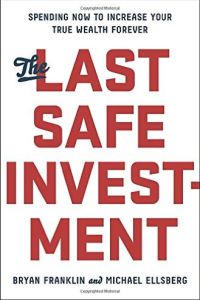
If you read financial blogs but have just started out, you would probably be shocked that it is possible not to work in Singapore and have everything paid for by dividend payouts. A decent number of these readers will then hunker down to figure out how the capitalist system in Singapore works.
It is of no surprise to me that many readers will feel jelly or salty about financially independent folks - to these guys, we must somehow be crooks!
I think my own success is actually quite conventional.
The basic framework even has a name - Financial Advice Commonly Delivered or FACD based on the excellent book shown above by Michael Ellsberg.
Here is how FACD works :
a) Earn money from a job.
b) Save a large chunk of it, delaying gratification for the next 2 decades.
c) Invest (and reinvest) in various instruments with an emphasis on stock equity.
d) Retire when dividend income/capital gains begin to exceed basic expenses. ( 4% withdrawal rate )
e) Be happy because you've won the game. ( Maybe at the expense of family and relationships )
Almost every FIRE initiates to grandmasters employs some kind of variant of FACD to meet their financial goals.
If financial success can be so cookie-cutter, then how do we explain that young readers, upon reading about my six-figure dividend income becomes so traumatized that they need other financial bloggers like Budget Babe to console them and make themselves feel better? (link)
Actually, there are many structural weaknesses of this FACD model that renders it useless to many Singaporean.
Take earning money for instance. Not all degrees are recognized the same way by the industry. A better local degree qualification can mean more than $1,000 per month in earnings. This means that FACD has a bias towards above-average academic ability.
On the other extreme, savings require a lot of willpower. Most American books on personal finance talk about saving 10% of your pay every month. To get comfortably retired, I needed to save about 60-70% of my take-home pay in my late 20s.
There is clearly a bias in FACD and it does not account for recent developments like the gig economy and the disruptive effects of AI on the ability of an average person to hold a day job. Even as this book addresses the issue by advising readers to develop the right skills, I think it does not have a full solution to the problem.
Because of the inadequacies of FACD, the industry has spawned multiple advisors and trainers in an attempt to fill this gap. As finance is a wicked problem, you will notice a significant variation in things that are taught and advice that is given.
Like the martial arts schools in Wu Xia novels, contradictions and conflict can arise.
As a content provider myself, I believe that the problem of financial independence can be tractable if you believe that a partial solution can make a positive difference in your life. In other words, if you cannot attain $10,000/month of dividend payouts, what about just aiming for $100 a month.
At $100 a month, at least your data plan is free.
dont forget that buying at GFC levels in 2009/2010 helped a great deal!!
ReplyDeleteWell, I am actively buying on leverage during virus season.
ReplyDeleteI bet very few will follow my lead when I do this!
I am. :)
ReplyDeleteHi Chris,
ReplyDeleteMy take is that it is more self-comforting to benchmark with ownself. Different people have different circumstance. Strive to be better than the record as per yesterday. This is sufficient as per my perspective.
WTK